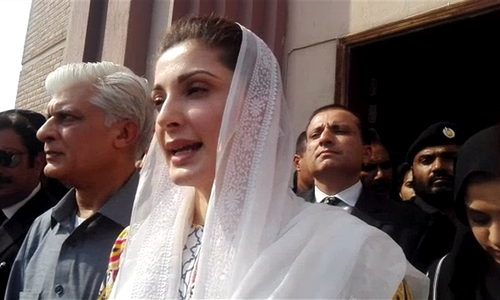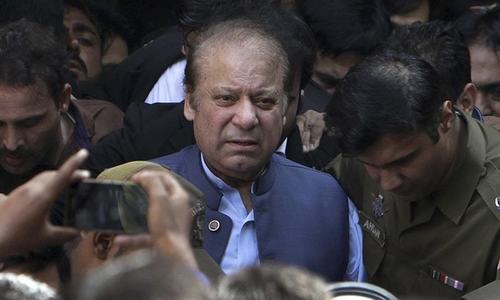ISLAMABAD: The Islamabad High Court on Wednesday reserved its decision on a petition seeking suspension of the seven-year sentence awarded to former prime minister Nawaz Sharif in the Al-Azizia Steel Mills reference.
Mr Sharif has sought suspension of the sentence and subsequent release on bail on medical grounds.
An IHC division bench comprising Justice Aamer Farooq and Justice Mohsin Akhtar Kayani reserved the judgement after lead defence counsel Khawaja Haris Ahmed and Additional Prosecutor General of the National Accountability Bureau (NAB) Jahanzeb Bharwana concluded their arguments.
Mr Haris contended before the court that successive medical boards had reported that Mr Sharif was suffering from multiple diseases and recommended his further medical examination and investigation.
He said that doctors were not taking any responsibility for Mr Sharif’s treatment and this was the reason that since the middle of January, six different medical boards had been constituted to examine his health condition.
The counsel said it was Mr Sharif’s fundamental right to get medical treatment from doctors and hospital of his choice.
He said that the former prime minister was facing problems related to kidney, heart, hypertension and diabetes.
“The fundamental right of the petitioner — that is the right to life — is being compromised due to his imprisonment and this is also a reason to establish hardship in his case,” Mr Haris said.
He told the court that the findings of the medical boards were consistent and none of the reports contradicted the stance of the petitioner.
He said that the report of a medical board even suggested that Mr Sharif should undergo angiography, adding that during his previous angiography, he had suffered complications that led to surgery.
He requested the court to suspend the sentence awarded to Mr Sharif to enable him to get timely treatment from doctors of his choice.
NAB’s Additional Prosecutor General Bharwana opposed the suspension of the sentence, saying that the medical reports had not raised apprehension that Mr Sharif’s life was at stake for being imprisoned.
He argued that the Supreme Court, in various cases including NAB’s appeal against suspension of sentence of Mr Sharif in the Avenfield properties reference, had outlined criteria according to which the high court could not grant bail to any convict under such circumstances.
Citing a letter annexed to the petition of Mr Sharif, Mr Bharwana said that as per the letter, Mr Sharif might proceed to the United Kingdom for his medical treatment.
The letter from Dr David Lawrence advises Mr Sharif to visit his hospital in the UK for medical treatment at the earliest.
However, the IHC bench reminded the prosecutor that Mr Sharif’s name was on the Exit Control List and he could not go abroad without approval by the government.
The prosecution alleged that the superintendent of Kot Lakhpat jail, in violation of standard operating procedure and jail manual, had shifted the former premier to hospital without prior approval of the inspector general (prisons).
However, a counsel for the Punjab government contradicted the claim, saying that the SP prisons had constituted the first medical board within the jail premises and the convict was shifted to hospital after obtaining approval from the authorities concerned.
Mr Bharwana said that Mr Sharif had filed a petition seeking suspension of the sentence on Jan 3 and it did not mention any medical grounds. However, the subsequent petition filed in February was entirely based on his ailments.
Justice Kayani remarked that a person could fall ill any time. “Are you sure you may not develop a health issue next month?” the judge asked Mr Bharwana and said that when someone fell ill only then they could seek relief on medical grounds.
When Justice Farooq asked the prosecution whether it was not a fundamental right of an accused or prisoner to get medical treatment of his choice, Mr Bharwana replied in the affirmative.
Published in Dawn, February 21st, 2019















































